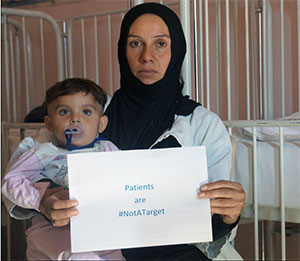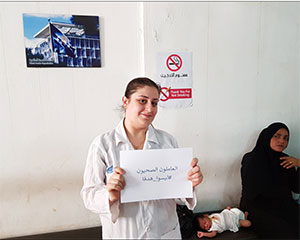 19 August 2018 – 8 years into the conflict in the Syrian Arab Republic, attacks on health care facilities and personnel in the country continue to rise despite United Nations resolutions strongly condemning these attacks. In the first 6 months of 2018, there were 126 separate attacks on health care in Syria – more than for the whole of 2017. Syria now accounts for a staggering 70% of all attacks on health care facilities documented by WHO worldwide.
19 August 2018 – 8 years into the conflict in the Syrian Arab Republic, attacks on health care facilities and personnel in the country continue to rise despite United Nations resolutions strongly condemning these attacks. In the first 6 months of 2018, there were 126 separate attacks on health care in Syria – more than for the whole of 2017. Syria now accounts for a staggering 70% of all attacks on health care facilities documented by WHO worldwide.
Thus far in 2018, 97 people, including health care staff and their patients, have been killed and 165 have been injured in these attacks. Most attacks were reported from rural Damascus, where Eastern Ghouta was the focus of intense hostilities in the first quarter of 2018, Idleb, and Dar’a governorate in southern Syria, where over a quarter of a million people fled during the violence in June 2018. Almost half of the country’s health care facilities are either partially functioning or closed as a result of attacks on health care facilities.

The above figures starkly illustrate the dangers faced by health care workers who risk their lives daily to help their fellow Syrians. Surgeons operate by candlelight. Health care workers literally work underground, in hospital basements, to save lives as their places of work are bombed and shelled. As the world marks World Humanitarian Day on 19 August around the theme of “Civilians are #NotATarget”, WHO honours the brave and dedicated health care workers in Syria.
Attacks on health care bear no explanation and no excuse,” said Dr Michel Thieren, WHO’s Regional Emergency Director for the Eastern Mediterranean. “Civilians, including medical workers and patients, have been systematically targeted in this conflict. Every time a health care worker is shot or a health facility is attacked, Syria loses a bit of itself. Violence that denies civilians access to health care is a blatant violation of international humanitarian law. Accountability for such crimes must be rendered, in order for them to stop.”
Through its continued advocacy, WHO seeks to ensure that health workers are protected in conflicts and are allowed to provide medical care in safe and protected environments when their patients need it most.
1 UN Security Council resolution 2286, adopted In May 2016.
1 WHO’s new online system – the global Surveillance System for Attacks on Health Care- tracks attacks on health care facilities and personnel worldwide.




